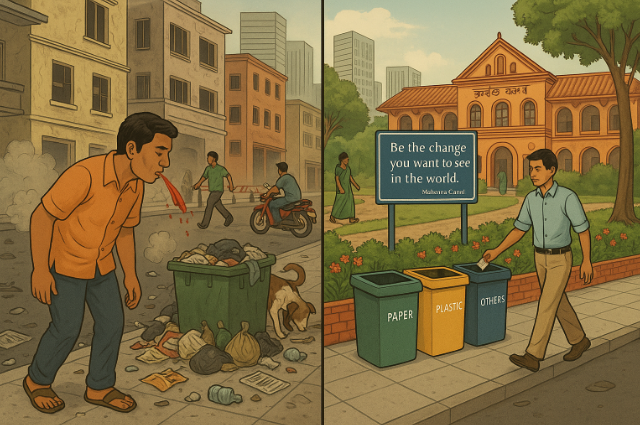
The Indian railways spend approximately 1,200 crores of taxpaying money annually to clean the gutka spits from its premises. It’s the taxpaying money that could have been invested in developing the infrastructure of the country or in the social welfare of the people. But the lack of civic sense in Indians hinders the country’s development. From gutka spits and littering to breaking traffic rules, people seem to have no civic consciousness or education. What the public doesn’t seem to realise is that this also has a negative impact on their physical and mental health. Garbage, when improperly managed, can lead to various serious diseases, and surrounding yourself in such an environment can cause mental stress and distress, ruining your mental peace.
What is civic sense?
Civic sense refers to the awareness and responsible behaviour of individuals within a community or society. It involves following the rules and regulations, keeping your public spaces clean, and contributing to the well-being and harmony of the community.
The argument Indians raise when asked to follow civic responsibility is that everyone is doing it, so why can’t we? We tend to keep our homes extremely clean, but don’t think twice before littering in a public space. Why? Because it’s public property. There is a need for an attitude change, and it starts with us. There is a subject called ‘civics’ in our schools where they teach the students ‘fundamental rights and duties,’ but not the basics of civic sense. The Indian education system must undergo a significant revamp and make civic education in schools compulsory. The local governments must educate their citizens on civic sense and push them towards change in society.
Be the change you want to see in the world—Mahatma Gandhi.
Why not change?
I brought a chips packet home, as there were no dustbins on the streets and I didn’t want to litter, and my mom asked me, ‘Why didn’t you throw it on the road? It’s not our home; it is a public space.’ A theory called ‘The tragedy of the commons’ conveys and discusses exactly this thought process. The tragedy of the commons describes a situation where individuals, acting independently in their own self-interest, deplete or spoil a shared resource, even when it is clear that doing so is ultimately detrimental to everyone. I said, ‘I didn’t want to make the footpath dirty, so I thought of throwing it in our dustbin.’ She replied, ‘Everyone is throwing waste there, and the place is already dirty!’ The theory that explains this thought is called ‘The broken window theory.’ The broken window theory suggests that actions like breaking windows and littering create an environment that encourages this behaviour and potentially leads to more damage. Then she continued, ‘Anyways, we are going to throw our waste there, so why bring more waste into the house?’ It was because my locality had no proper waste management system.
How to change?
The first step to fostering improved civic sense is civic education. Civic education prepares individuals to be active and engaged citizens by providing them with the knowledge, skills, and values necessary to participate in their communities and contribute to a democratic society. A multi-pronged approach is needed, which encompasses education, community engagement, infrastructure development, and individual responsibility. The school curriculum must integrate civic sense education into the syllabus, which focuses on topics like public property, waste management, and participation. The government must launch large-scale public interest campaigns using various media to promote responsible behaviour and discourage littering, vandalism, and other uncivil acts. In the modern era of social media, we can utilise the social media platforms to disseminate information, share inspiring stories of change, and engage citizens in discussions about civic responsibility. India has strict laws, but enforcing the laws is necessary for change to happen. The government must implement and enforce laws and regulations related to public behaviour, including fines for littering, vandalism, and other violations. This will hold the masses accountable for their actions and make them responsible for their future actions. The government must invest in effective waste management systems and infrastructure. Proper waste segregation facilities and recycling plants must be developed in every locality and must be tracked to ensure their efficiency. The citizens must ensure that they segregate the waste before handing it to the waste trucks. This will create an example that fosters a culture of cleanliness. The most important step is to be the change that you want to see in the world, as Mahatma Gandhi once said. Cultivating a sense of ownership and responsibility towards public property and treating it with respect and care is our individual responsibility and must be strictly followed. The community must participate and cooperate within itself, which hinders the division of society caused by the lack of civic sense.
Is there hope?
The cleanest city in India, Indore, is the best example. Indore was not always clean. It scaled up from the 149th position on the clean city index in 2014 to 25th in 2016 and finally bagged the 1st position in 2017. Indore achieved its status through a combination of efficient waste management practices, public participation, and a strong emphasis on segregation and processing of waste. Every household in the city is covered under a well-orchestrated daily collection system, and the trucks with GPS tracking and dual compartments pick up waste every single day and from every house. This, along with community cooperation and participation, ensured clean streets in the city. The other cities of the country must take Indore’s example and formulate an efficient strategy to transform their premises.
By implementing these strategies, India can cultivate a stronger sense of civic responsibility and create a more harmonious and livable environment for all.
